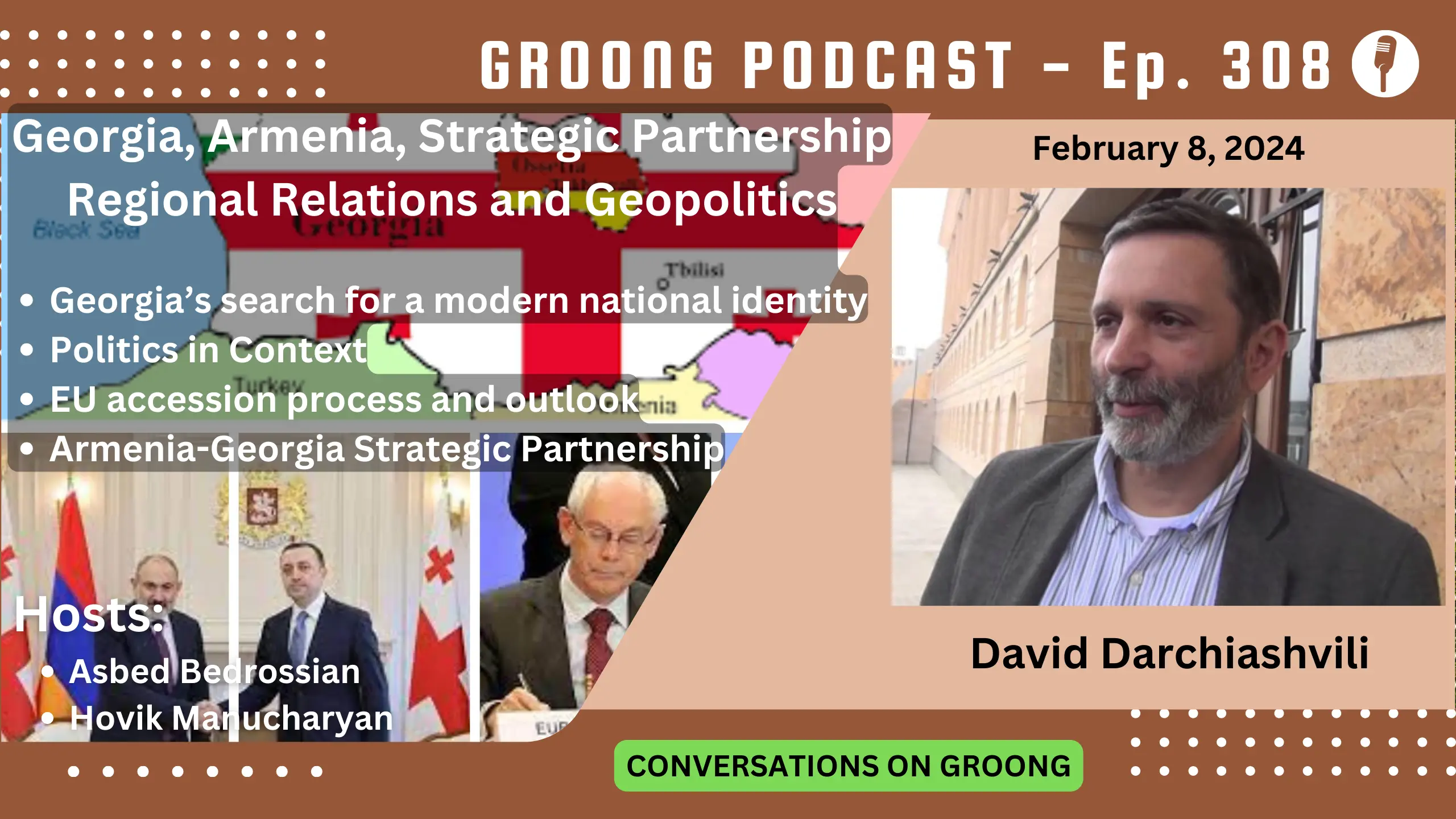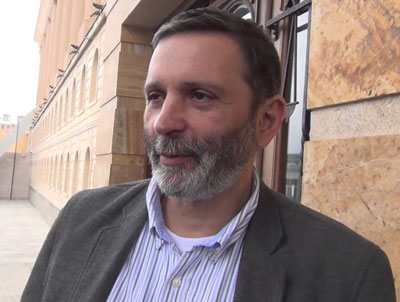
Groong Links:
Guest:
Topics:
- Georgia’s search for a modern national identity
- Politics in Context
- EU accession process and outlook
- Armenia-Georgia Strategic Partnership
Episode 308 | Recorded: February 7, 2024
Show Notes
Dr. Darchiashvili, as this is your first time on our show, please tell us a little bit about yourself, your interests and your endeavors!
Georgian Politics
Over the past two decades, Georgia has weathered storms of political upheaval, economic instability, and even outright conflict. The scars of the 2008 Russo-Georgian War still linger, serving as a stark reminder of the tumultuous times the nation has endured. In the aftermath of the Rose Revolution in 2003, hopes were high for democratic consolidation and economic prosperity. However, the road to progress was marred by internal divisions, external pressures, and regressions in reforms.
Question:
- In hindsight, what would you identify as the key factors that contributed to Georgia’s struggles during this period?
Domestic Political Context
There’s a running joke in Armenia that wherever Pashinyan visits, the government resigns. He visited Georgia on January 26 and the following day, Georgia’s prime minister Gharibashvili resigned. On February 2 Pashinyan visited Kazakhstan and on February 5 the government of Kazakhstan resigned. Pashinyan’s travel itinerary should come with a disclaimer: ‘Warning: may cause sudden vacancies in government positions… except in Armenia, where apparently such luck takes a vacation!’
Questions:
- Who are the major political forces in Georgia and what makes them tick?
- What is the political context for Gharibashvili’s resignation?
- How are domestic politics evolving in Georgia?
- What does Kobakhidze’s appointment as acting PM mean?
EU Accession
On 14 December 2023, the EU accepted Georgia’s application for candidate status. Yet, one can imagine that Georgia’s EU ascension journey is just beginning.
Questions:
- How complex is the process? What are the major requirements set by the EU? And how long will it take?
- Georgia was granted candidate status, while starting negotiations with Ukraine & Moldova. Why this differentiation from the EU?
- If Georgia becomes a member of the EU, will Armenians require a Schengen visa to enter Georgia, or visit Tbilisi? Do you think the EU has plans for some special arrangements for Armenia to take into account issues like this?
Georgia’s (and Ukraine’s) membership candidacy comes in the midst of a brutal war that is now almost 2 years old with no end in sight. In this context, there is immense pressure from major warring sides to pull countries in their direction. So far, Georgia has managed to successfully navigate these turbulent diplomatic waters.
Questions:
- Unlike Armenia, Georgia’s government has managed to walk the fine line between the warring sides. What do you think has contributed to this diplomatic success?
- What is Russia’s response and policy towards Georgia’s EU membership?
Georgia’s military is already very much integrated with NATO. And I’m sure many Georgian political forces would support deepening that by official membership. We know that Russia gets extremely irritated when a NATO official praises Armenia for some policy or another. We also know Russia’s insistence on having a neutral Ukraine on its borders and this issue could be cited as one of the main reasons for the war in Ukraine.
Questions:
- What are the Russian red lines in terms of Georgia’s potential for joining NATO?
Armenia - Georgia Strategic Partnership
On January 26, Pashinyan was in Tbilisi, meeting with Georgian Prime Minister Irakli Gharibashvili. A strategic partnership agreement was signed between the two countries that encompass nearly a dozen spheres, excluding defense, but not a lot is known about the content of the agreement yet.
Regardless of their political leanings, all Armenians place a high value in the improvement of relations with Georgia but many of us want to know what real benefits this deal will provide. Additionally, different analysts have differing interpretations of this development: some claim that this is a step in the direction of pulling Armenia more towards the west; while others say that this move will benefit the Iran-Armenia-Georgia geopolitical axis and economic North-South corridor, strengthening relations with Iran.
Questions:
- Why isn’t the deal publicized?
- How should we view this development between Armenia and Georgia, especially as Georgia is making moves towards joining the EU? What specific material benefits can we expect?
- How is this partnership seen by Russia and Iran? Especially since Iran is highly interested in the INSTC North-South economic corridor through Armenia and Georgia to the Black Sea.
Military Cooperation
During the 44 day war, we saw that Georgia actually blocked military supplies from Russia to Armenia. Even during the latest shipment of French “Bastion” armored personnel carriers, there was news that the shipment was held up in Georgia until Paris twisted Tbilisi’s arms. Meanwhile on a weekly basis we see military supplies from countries like Israel and Turkey pass unfettered through Georgian airspace and territory.
Questions:
- Why was defense cooperation left out of the signed strategic partnership?
- Georgia has defense cooperation agreements with Azerbaijan. Will those agreements continue to trump Armenian-Georgian cooperation?
- Can this upgrade in relations help Armenia achieve a more balanced stance by Georgia as a military and non-military corridor for itself and Azerbaijan?
Georgia is concerned about Russian influence and encroachments from the north. Armenia is concerned about Turkish influence on Georgia from the south. Turkey, of course, is the hand of NATO in the South Caucasus.
Questions:
- How does Georgia view Turkish influence on Georgia and the South Caucasus in general?
- What is Georgia’s strategy towards Turkey? How does it plan to maintain long term peaceful relations with it?
Wrap-up
That’s our show! We hope you found it useful. Please find us on Social Media and follow us everywhere you get your Armenian news. Thanks to Laura Osborn for the music on our podcasts.
Guests

David Darchiashvili
Dr. David Darchiashvili is a Former MP of the Georgian Parliament from the party United National Movement (2008-2016). Currently he’s not affilicated with any political parties and concentrates on his research and teaching at Ilia State University Tbilisi, with expertise in International Relations. From 2002-2003 Dr. Darchiashvili was a visiting scholar at Johns Hopkins University in Washington D.C. He has authored many articles and books, one of his latest publications is Georgia: Warlords, Generals, and Politicians, By David Darchiashvili and Stephen Jones, 2020, Oxford Research Encyclopedias.
Hosts

Hovik Manucharyan
Hovik Manucharyan is an information security engineer who moved from Seattle to Armenia in 2022. He co-founded the ANN/Groong podcast in 2020 and has been a contributor to Groong News since the late 1990s.
Disclaimer: The views expressed by Hovik Manucharyan on the ANN/Groong podcast are his own and do not necessarily reflect the opinions of his employer or any other organization.

Asbed Bedrossian
Asbed is founder of the Armenian News Network Groong and co-founder of the ANN/Groong podcast.